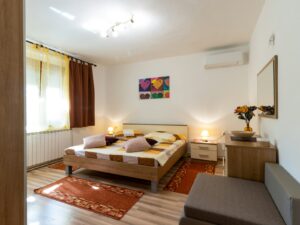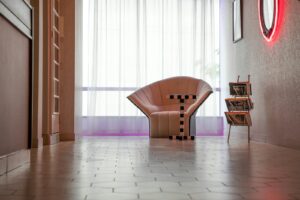Mahogany is an excellent choice for flooring. Its rich color, durability, and resistance to pests make it a popular hardwood option. With its distinct grain pattern and natural beauty, mahogany adds warmth and elegance to any space. Additionally, its high density contributes to long-lasting durability, making it a favorable choice for both residential and commercial flooring projects.
Mahogany refers to a variety of tropical hardwood trees in the genus Swietenia, typically prized for their rich reddish-brown color, durability, and attractive grain patterns. Mahogany wood is often used in furniture making, cabinetry, flooring, and musical instruments due to its beauty and strength.
Mahogany trees are native to the Americas, primarily found in tropical regions such as Central and South America, as well as parts of the Caribbean. Some of the most well-known species include Cuban mahogany (Swietenia mahagoni), Honduran mahogany (Swietenia macrophylla), and West African mahogany (Khaya spp.). However, due to overharvesting and habitat destruction, many species of mahogany are now considered endangered or threatened, leading to restrictions on their trade and use.
Pros of Mahogany Flooring
Durability
Mahogany is a hardwood, which generally means it’s denser and harder than softwoods like pine or cedar. This hardness contributes to its ability to resist dents and scratches.
Mahogany wood contains natural oils that make it resistant to decay and insect damage. This inherent resistance to rotting makes it suitable for outdoor applications as well, such as boat building and outdoor furniture.
Mahogany tends to be relatively stable once properly dried and seasoned, meaning it’s less prone to warping, shrinking, or swelling with changes in humidity or temperature compared to some other woods.
Hardness
Mahogany’s hardness on the Janka hardness scale can vary depending on the species. Here are the Janka hardness ratings for a few common species of mahogany
Honduran Mahogany (Swietenia macrophylla): Typically ranges from 800 to 900 lbf (pounds-force) on the Janka scale.
African Mahogany (Khaya spp.): Ranges from about 830 to 1100 lbf on the Janka scale, depending on the specific species and origin.
Santos Mahogany (Myroxylon balsamum): Not a true mahogany but often referred to as such due to its similar appearance. It has a Janka hardness rating of around 2200 lbf, making it significantly harder than most true mahogany species.
Water Resistant
Mahogany contains natural oils that help to make it somewhat resistant to moisture, rot, and insect damage. These oils provide a degree of protection against water penetration.
Mahogany is a dense hardwood, which means it has a relatively tight grain structure that makes it less permeable to water compared to softer woods. This density contributes to its resistance to warping, swelling, and decay when exposed to moisture.
Unique Grain Pattern and Natural Beauty
The unique grain pattern of mahogany is a testament to its natural beauty, creating a floor that not only withstands the test of time but also stands out aesthetically. This combination of strength and visual appeal makes mahogany an excellent choice for those seeking a flooring option that is both durable and captivating.
Warmth and Elegance
Mahogany flooring exudes warmth and elegance, making it a versatile fit for various design styles. Whether you prefer a classic, traditional look or a more contemporary aesthetic, mahogany seamlessly complements your vision. The rich tones and sophisticated appearance contribute to an atmosphere of timeless charm.
Versatility for Various Spaces
From residential homes to commercial establishments, mahogany flooring is versatile enough to enhance the beauty of any space. Its timeless charm adapts well to different interior designs, providing a lasting impression for years to come. Mahogany’s versatility ensures it is a flooring option suitable for a wide range of environments.
Contributing to Property Value
Investing in mahogany flooring can contribute to the overall value of your property. The enduring beauty and durability of mahogany make it an attractive feature for potential buyers, positioning it as a wise choice for both homeowners and property investors looking to enhance the market value of their spaces.

Cons of Mahogany Flooring
Cost
Mahogany is generally more expensive than many other types of wood flooring. Prices can range from $5 to $15 or more per square foot, depending on factors such as the species of mahogany, the grade of the wood (clear, select, or common), and any additional features like hand-scraped or distressed finishes.
Availability
Some species of mahogany, such as genuine Honduran mahogany (Swietenia macrophylla), are becoming increasingly scarce due to overharvesting and habitat destruction. This can lead to limited availability and higher prices for genuine mahogany flooring.
Softness
While mahogany is a hardwood, it’s not as hard as some other options like oak or maple. This means it may be more prone to denting and scratching, especially in high-traffic areas or homes with pets and children.
Color Variation
Mahogany flooring can exhibit significant color variation, even within the same species. Some homeowners may find this variation appealing, while others may prefer a more uniform look.
Sensitivity to Moisture
While mahogany is relatively water-resistant compared to some other woods, it’s still susceptible to damage from excessive moisture. Proper precautions, such as maintaining humidity levels and promptly cleaning up spills, are necessary to prevent issues like warping and mold growth.
Maintenance Requirements
Like any wood flooring, mahogany requires regular maintenance to preserve its appearance and durability. This may include periodic refinishing, polishing, and protective treatments to maintain its finish and protect it from wear and tear.
Considerations for Mahogany Flooring
Cost and Budget Considerations
While the allure of mahogany flooring is undeniable, it’s important to consider your budget before making a decision. Mahogany is often categorized as a premium hardwood, and its cost may be higher than other flooring options. Understanding the cost implications, including the price of the raw material, installation, and potential maintenance, will help you make a well-informed decision that aligns with your financial constraints.
Maintenance Requirements
Mahogany flooring, like any natural material, requires proper maintenance to preserve its beauty and structural integrity. Regular cleaning to remove dirt and debris, along with occasional refinishing, is essential to keep mahogany floors in optimal condition. Consider the time and effort you are willing to invest in maintenance when choosing mahogany.
Environmental Impact and Sustainability
In an era of increasing environmental awareness, it’s crucial to consider the environmental impact of your flooring choice. Mahogany, like many other hardwoods, is sourced from forests, and irresponsible logging practices can contribute to deforestation and environmental degradation. To address this concern, look for mahogany certified by sustainable forestry programs, such as the Forest Stewardship Council (FSC).
Conclusion
In conclusion, mahogany flooring stands as a timeless and elegant choice for those seeking durability, beauty, and versatility. By understanding its characteristics, advantages, considerations, and proper installation methods, you can confidently choose mahogany as the ideal flooring option for your home or commercial space. Invest in the enduring allure of mahogany, and enjoy a floor that not only withstands the test of time but also elevates the aesthetic appeal of your space to new heights.
Read More




